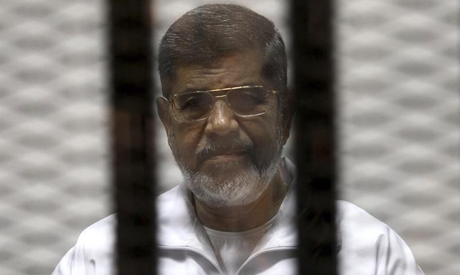 |
| Morsi in the courtroom (Reuters) |
The Cairo Criminal Court has sentenced the former Egyptian presidnet Mohamme Morsi to death in the case of the 2011 Wadi Natroun prison outbreak, along with Supreme Guide of the Muslim Brotherhood Mohamed Badie, his
deputy Mahmoud Ezzat, former prliamentary speaker and guidance bureau
members Mohamed al-Beltagy, Essam al-Erian and Saad al-Husseiny, in
addition to over one hundred other defendants.
The court referred referred the papers of of the case of Morsi and the other leading Muslim Brotherhood figures to the Grand Mufti for review.
The case had to do with the mass escape that occurred at Wadi Natroun prison during the security void in the early days of the 2011 revolution, enabling several Muslim Brotherhood leaders to escape from prison, among hundreds of other prisoners, including members of the Palestinian Hamas and Lebanon's Hezbollah, according to the prosecution.
Al Jazeera aired a telephone interview with Morsi after the prison break, in which he said civilians had stormed the prison and that he and other Brotherhood detainees had stayed at the prison and were waiting to be told what they should do next by officials.
Hamas issued a statement in which they said some of the defendants sentenced for the prison escape were martyred before the revolution erupted in Egypt, like Tayseer Abu Seneima and Hossam al-Sanea, or were detained in Israeli prisons, like Hassan Salama, who they say has been in prison for 19 years.
Morsi also received a provisional death sentence, along with 15 Brotherhood members, in the case relating to espionage with Qatar, Hamas and Iran's revolutionary guard. This ruling has also been sent to the Mufti for review.
The defendants face charges of leaking sensitive intelligence reports and military information to Qatari authorities, with the help of a Qatari officer and Al Jazeera.
The top rank of Brotherhood leaders have now all been sentenced to death. Badie was sentenced to death in April in the “Rabea operations room” case, and was handed four life sentences in other cases. In April, Morsi was sentenced to 20 years in prison for ordering the arrest and torture of demonstrators outside the Presidential Palace in December 2012 clashes. If the court upholds the death sentence on June 2, and any possible appeals are rejected, Morsi could be Egypt's first president to face the death sentence.
Amnesty International released a statement calling the trial a "charade" on Saturday. “Condemning Mohamed Morsi to death after more grossly unfair trials shows a complete disregard for human rights. His trials were undermined even before he set foot in the courtroom. The fact that he was held for months incommunicado without judicial oversight and that he didn’t have a lawyer to represent him during the investigations makes these trials nothing but a charade based on null and void procedures,” said Said Boumedouha, deputy director of Amnesty International’s Middle East and North Africa Programme.
They urged Egypt's authorities to disregard all evidence obtained whilst Morsi and co-defendants were "forcibly disappeared" and said they should either be released immediately or retried in a civilian court in line with Egyptian and international law.
Morsi was ousted on July 3, 2013, by a military-backed interim government following mass protests against his presidency.

.jpg)
.jpg)


No comments:
Post a Comment